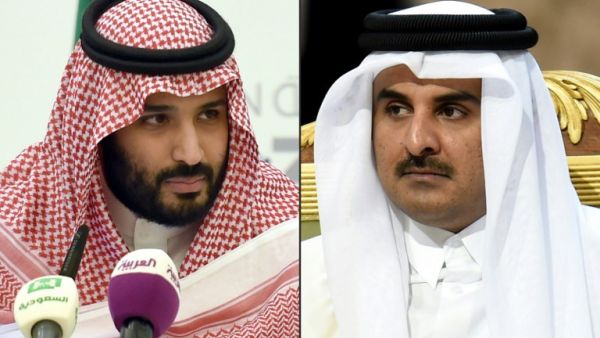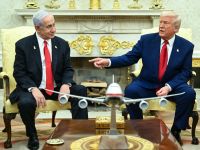The crisis in diplomatic relations that the Gulf has seen since June is peak 2017.
Characterized by claims of fake news and Twitter spats, the rupture in ties between Qatar and its former allies Saudi Arabia, Bahrain, UAE and Egypt has been a thoroughly modern fall-out.
And those elements both feature in the latest controversy of the crisis.
On Friday, news began circulating online that ISIS had ‘pledged allegiance’ to Doha.
According to Middle East Eye (MEE), the news was first shared by Saudi state-owned Al Ekhbariya channel, in a tweet on Friday night.
عاجل | تنظيم "داعش" الإرهابي يعلن تضامنه مع #السلطات_في_الدوحة ضد #الدول_الداعية_لمكافحة_الإرهاب. #الإخبارية #داعش_تناصر_قطر
— قناة الإخبارية (@alekhbariyatv) September 8, 2017
Breaking: The terrorist 'Daesh' group declares its solidarity with #authorities_in_Doha against the #countries_calling_to_fight__against_terrorism. #Alekhbariya #Daesh_Supports_Qatar
An image shared widely online purporting to be a statement from the group said that it “announced the solidarity of the state with brother Qatar”.
Given that it was over claims of Qatar’s support for terror that Saudi and its allies justified severing links with their tiny neighbor, the announcement seemed for some like a confirmation of Doha's wrongdoing.
The hashtag “Daesh supports Qatar” quickly took off.
One Emirati banker, @HSajwanization tweeted: “Here we go #ISIS officially declares solidarity with #Qatar, describing boycotting countries as infidels #QatarFundsTerror #Daesh_Supports_Qatar”
A young Saudi, @999saudsalman, tweeted “Isis refers to Qatar as 'our close friend'…This despicable mess of a country has always supported terrorism… #Daesh_Supports_Qatar”
Meanwhile, Saudi journalist, @fahdalruqi, said on Twitter: “Anyone who still has doubts about Qatar's adoption of terrorism and terrorists, here is ISIS announcing it stands with Qatar.”
Another Saudi journalist, @salem_alahmadi, simply wrote: “Birds of a feather flock together”.
Inevitably, Qataris were the first to call out the declaration as ‘fake news’. Among them, pro-Qatar MEE, which pointed out that it was an alleged hack of Qatar's state news agency that the sparked crisis.
@asma4448992 tweeted: “This is not true I'm always with Qatar”, while journalist @zaidbenjamin described it as a “fabricated statement” from Saudi Arabia.
- Has Gulf Twitter Finally Realized How Hashtags Work?
- Fake News Gulf Crisis Style: No, Al Arabiya, Qataris Are Not Begging Their Emir to Step Down
- Saudis Invited to Inform on Qatar Sympathizers via Twitter ‘Blacklist’
But what is really going on?
It would certainly help the narrative of Saudi Arabia and its allies to frame Qatar as having support from the most prominent extremist Islamist organization of the moment.
Saudi Arabia in particular has used social media as a means to stir anti-Qatar sentiment during the crisis.
Saud al-Qahtani, a previously obscure member of the Saudi royal family, has come to prominence as a key social media personality. Al-Qahtani has shared a constant stream of anti-Qatar rhetoric to his 565,000 Twitter followers, including encouraging Saudis to inform on Qatar sympathizers with the hashtag “blacklist”.
Saudi-backed Qatari royal Sheikh Abdullah Bin Ali Al-Thani also gained a Twitter account and following amid speculation of an outside attempt to force a change to Qatar's leadership.
It would not be surprising should this emerge as yet another anti-Qatari campaign on the social media site.
If this is the case, the timing of the incident is interesting, coming just as the Saudi Crown Prince spoke on the phone with Qatar's Emir, for the first time since tensions began.
This, only hours before the former would suspend communication with Doha over its alleged “distorting of facts” about details of the conversation.
Was it really a Saudi fabrication, an attempt to offer indirect justification for the halted talks?
Or could it have been a real ISIS announcement of solidarity with Qatar?
After all, an “announcement of solidarity” is very different from a “pledge of allegiance” as some were calling it, and as the popular hashtag implied.
Like Saudi Arabia, the international terrorist organization is well-known for its exploitation of social media.
ISIS has used the Internet to recruit supporters from all over the world to join it in Syria, Iraq and Libya, and to carry out attacks in the West.
While Saudi Arabia and its allies have accused Doha of funding ISIS and Al Qaeda, a Haaretz article from July pointed out that similar accusations had been directed at the boycotting states themselves.
The UK’s Channel 4 said in a Factcheck article, also from July, that both Saudi Arabia and Qatar had been accused of funding ISIS in leaked emails from the office of Hillary Clinton.
The Channel 4 report said that “it certainly seems that people in the highest ranks of US government have had good reason to believe money is flowing between Saudi Arabia and ISIS,” and, by implication, Qatar and ISIS.
However, the piece pointed out that a distinction needs to be drawn between recognizing Saudi money is reaching ISIS and accusing the government of actually funding it.
If both Saudi Arabia and Qatar have been associated, however indirectly, with ISIS, why would it come out on the side of the latter?
If ISIS really had links to Qatari leadership then why would it have announced it publicly, given how strongly Doha has refuted claims it sponsors terror?
Just another day in the hazy, fake-news and viral hashtag-filled world of the Gulf crisis.







